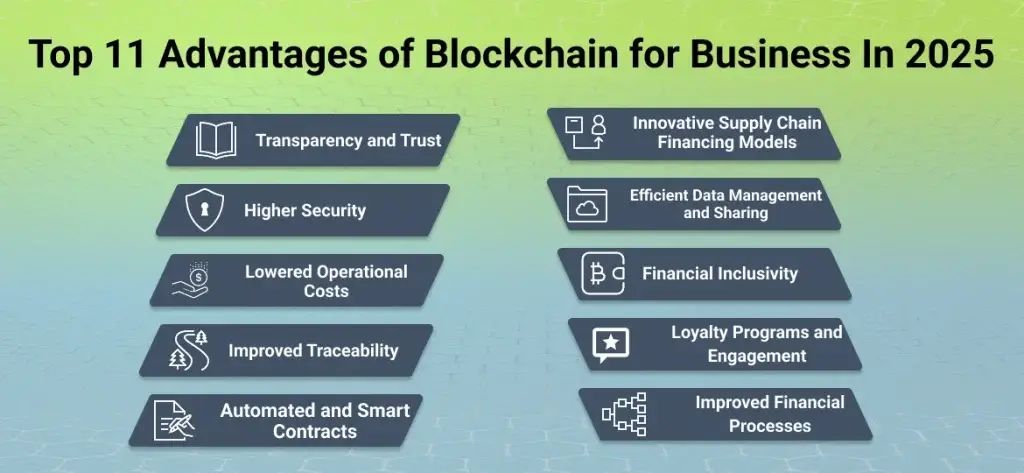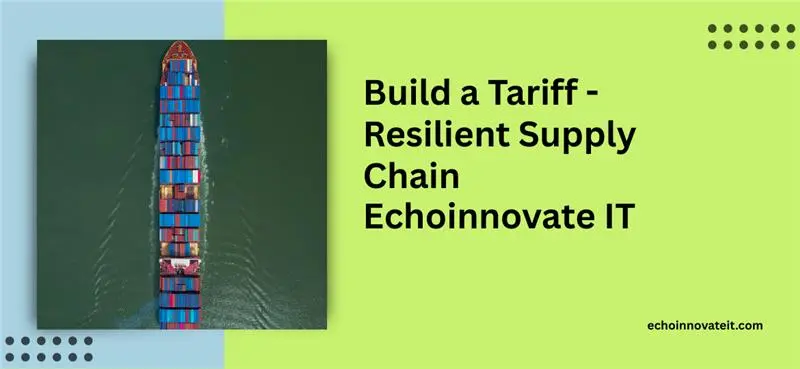In the rapidly changing digital environment, businesses face multiple challenges to maintain the safety and transparency of their business operations. Blockchain technology offers a promising solution to these challenges and offers incredible benefits that could transform how companies operate in 2025. When we look into the top 11 Blockchain benefits for business this year, we expect readers to gain valuable knowledge about how blockchain technology can boost efficiency and security as well as trust across a variety of sectors.
With the help of blockchain technology, companies can discover new avenues for growth and development while protecting data integrity and creating the development of a more globalized economy. By making use of blockchain technology, businesses can streamline their processes and reduce costs, increase the speed of transactions, improve the security of data, remove intermediaries, create open supply chains that allow seamless payments across borders, guarantee an immutable record-keeping system, increase trust between stakeholders and spur innovation with blockchain-based smart contracts as well as decentralized apps.
Popular AI Features For Mobile Apps In 2025

Blockchain is an exciting technology that is transforming businesses in numerous ways, from enhancing customer service to reducing operating expenses. Blockchain has many applications across different industries.
Examples include observing food supply chains to avoid outbreaks, reducing the dependence on stock exchanges and brokers for trading in shares, and using digital signatures to prove ownership for the sale of intellectual property. Here are some of its benefits:
1. Transparency and Trust
Blockchain offers businesses high amounts of accountability and transparency. It is an extremely secure and tamper-proof ledger. This makes it a great solution for shipping, banking stocks, and other sectors that require a lot of documentation or verification procedures.
Faster transactions Blockchain networks handle payments 24 hours a day and lower transaction costs through the elimination of intermediaries as well as automatizing contract execution, or “smart contracts in business“, when certain conditions are satisfied. For instance, a tiny boutique coffee shop might use tokenization to raise money and provide discounted future purchases to customers.
2. Higher Security
Blockchain technology is an essential asset that creates trust in places where it would otherwise be difficult or impossible to attain it, for instance, between organizations that don’t directly have an affiliation but who need to exchange information or pay for services. Supply chains, for instance, can use blockchain to track items from farm to retailer quickly and accurately – for instance, tracing food back to its source in seconds rather than days – helping ensure transparency and accountability. At the same time, smart contracts automate business processes to minimize human intervention.
3. Lowered Operational Costs
Automation streamlines processes and improves them, boosting operational efficiency and productivity. It also improves customer service. This is how the process of revolutions takes place, and business models change. Blockchain allows tracking the entire process from creation to delivery in real-time, thereby increasing transparency while reducing fraud. In addition, it could help industries that are suffering from food safety incidents by helping manufacturers identify the source of the issue.
Blockchain technology provides new efficiency in financial services, such as trading and banking. It also protects the academic credentials of students and resumes, enhances transparency in real estate contracts, and monitors media content.
4. Improved Traceability
Blockchain offers an irrevocable track of every transaction, which makes it perfect to track the movements of items as well as information. Blockchain for supply chain management, this traceability permits businesses to trace their products from their source to the final consumer, assuring authenticity and high quality. This is particularly important in sectors such as pharmaceuticals and food, where safety and traceability of products are crucial. Better traceability can also help businesses find and correct inefficiencies, cut down on fraud, and improve customer satisfaction.
5. Automated and Smart Contracts
The blockchain has long been associated with transactions in cryptocurrency. However, it also offers businesses an efficient solution to many other issues. Smart contracts can automate processes that take action automatically in the event that certain conditions are met.
Supply chains rely on multiple parties to monitor shipping. Blockchain networks’ immutable capabilities for tracking documents could eliminate intermediaries and make tracking back orders much more straightforward, which means lower expenses and risk for businesses.
6. Innovative Supply Chain Financing Models
Blockchain databases allow secure access, greater transparency, and authenticated transactions in foreign trade that involve a large amount of paperwork that is susceptible to fraud. When documents are stored on the blockchain, captains of ships and clients, financiers, harbor managers, and insurance companies are able to track the progress of their deliveries in real time more easily.
Blockchain can also cut costs by removing intermediaries. For instance, Veem utilizes it to let businesses transfer money overseas without paying costs from banks. While initially linked to cryptocurrency, such as Bitcoin, blockchain technology is currently being employed across various industries to provide a safe, reliable, effective, and secure method for conducting business.
7. Efficient Data Management and Sharing
Companies that need to handle large volumes of transactions can find blockchain development companies a cost-effective and efficient option since it eliminates intermediaries, decreases costs for transactions, and speeds up procedures.
Blockchain for data security can also increase security while speeding the process; for example, the transfer of funds between banks internationally can be completed in minutes instead of days.
In addition, it helps secure voting systems and efficiently manages public records. Blockchain also can save companies cash on legal documentation by automating procedures and intelligent contracts, which makes managing ownership of products much simpler.
8. Financial Inclusivity
Blockchain is a promising technology that could increase financial inclusion by providing access to financial services to people who are not served. In reducing the necessity of traditional bank infrastructures, the blockchain could reduce the costs of transactions in the financial sector and make them easier to access. This will empower people as well as businesses in developing nations and also those who are marginalized from traditional financial services, encouraging the growth of their economy and creating opportunities.
9. Loyalty Programs and Engagement
Blockchain could revolutionize loyalty programs by establishing safe and transparent methods to reward customers. Utilizing blockchain to monitor the loyalty point balance, companies can make sure that rewards are correctly dispersed and can be exchanged. This increases customer trust and increases engagement. Blockchain can also facilitate the development of decentralized loyalty programs that allow customers to earn rewards and redeem them across multiple platforms and companies.
10. Improved Financial Processes
Blockchain can simplify and streamline many financial processes, including settlements, payments, and audits. By eliminating intermediaries and reducing the need for manual data entry, Blockchain can cut down on costs for transactions and processing times. This can result in significant improvement in accuracy and efficiency. In addition, the immutable audit trail improves transparency and decreases the chance of fraud. This makes financial operations more secure and reliable.
11. Tokenization
Tokenization lets companies trade assets without revealing their true value, thus cutting down on risk while saving time and money and allowing for more effective business collaboration. Tokens are a great option for instant investment and transfer. A transaction that could have taken weeks could now be completed within a matter of minutes.
Blockchain can provide businesses with significant cost-cutting advantages. It streamlines processes, cuts down paperwork, and eliminates intermediaries while also creating an irrevocable track of transactions, which helps to make fraud less likely and hackers more difficult to access.
Conclusion
When we have completed our analysis of the top 11 advantages from Blockchain to Business for 2025 it’s clear that the potential of this groundbreaking technology to revolutionize industries is enormous. With the help of blockchain technology, companies can improve security, transparency and efficiency in their business.
The future of blockchain in business holds exciting opportunities for businesses that adopt and utilize blockchain technology to keep pace with the ever-changing world of technology. The future is full of exciting opportunities for businesses that are willing to adopt and utilize blockchain technology to remain ahead of the ever-changing world of technology and enable forward the way they do business.
FAQs: Top 11 Advantages of Blockchain for Business in 2025
How does blockchain improve business security?
Blockchain offers tamper-proof data storage with decentralized encryption, making it highly resistant to fraud, cyberattacks, and unauthorized access.
Can blockchain help reduce business costs?
Yes! By eliminating intermediaries, automating transactions through smart contracts, and ensuring transparent record-keeping, businesses can cut operational costs significantly.
How does blockchain enhance supply chain management?
Blockchain enables real-time tracking, transparent record-keeping, and fraud prevention, ensuring secure and efficient supply chain operations.



